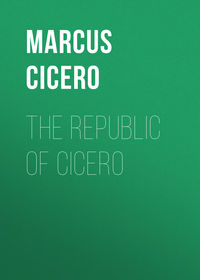 полная версия
полная версияCicero's Tusculan Disputations
They are said to have been the first workers in iron. They were called Idæi, because they inhabited about Mount Ida in Crete, and Dactyli, from δάκτυλοι (the fingers), their number being five.
252
From whom, some say, the city of that name was called.
253
Capedunculæ seem to have been bowls or cups, with handles on each side, set apart for the use of the altar.—Davis.
254
See Cicero de Divinatione, and Ovid. Fast.
255
In the consulship of Piso and Gabinius sacrifices to Serapis and Isis were prohibited in Rome; but the Roman people afterward placed them again in the number of their gods. See Tertullian’s Apol. and his first book Ad Nationes, and Arnobius, lib. 2.—Davis.
256
In some copies Circe, Pasiphae, and Æa are mentioned together; but Æa is rejected by the most judicious editors.
257
They were three, and are said to have averted a plague by offering themselves a sacrifice.
258
So called from the Greek word θαυμάζω, to wonder.
259
She was first called Geres, from gero, to bear.
260
The word is precatione, which means the books or forms of prayers used by the augurs.
261
Cotta’s intent here, as well as in other places, is to show how unphilosophical their civil theology was, and with what confusions it was embarrassed; which design of the Academic the reader should carefully keep in view, or he will lose the chain of argument.
262
Anactes, Ἄνακτες, was a general name for all kings, as we find in the oldest Greek writers, and particularly in Homer.
263
The common reading is Aleo; but we follow Lambinus and Davis, who had the authority of the best manuscript copies.
264
Some prefer Phthas to Opas (see Dr. Davis’s edition); but Opas is the generally received reading.
265
The Lipari Isles.
266
A town in Arcadia.
267
In Arcadia.
268
A northern people.
269
So called from the Greek word νόμος, lex, a law.
270
He is called Ὦπις in some old Greek fragments, and Οὖπις by Callimachus in his hymn on Diana.
271
Σαβάζίος, Sabazius, is one of the names used for Bacchus.
272
Here is a wide chasm in the original. What is lost probably may have contained great part of Cotta’s arguments against the providence of the Stoics.
273
Here is one expression in the quotation from Cæcilius that is not commonly met with, which is præstigias præstrinxit; Lambinus gives præstinxit, for the sake, I suppose, of playing on words, because it might then be translated, “He has deluded my delusions, or stratagems;” but præstrinxit is certainly the right reading.
274
The ancient Romans had a judicial as well as a military prætor; and he sat, with inferior judges attending him, like one of our chief-justices. Sessum it prætor, which I doubt not is the right reading, Lambinus restored from an old copy. The common reading was sessum ite precor.
275
Picenum was a region of Italy.
276
The sex primi were general receivers of all taxes and tributes; and they were obliged to make good, out of their own fortunes, whatever deficiencies were in the public treasury.
277
The Lætorian Law was a security for those under age against extortioners, etc. By this law all debts contracted under twenty-five years of age were void.
278
This is from Ennius—
Utinam ne in nemore Pelio securibusCæsa cecidisset abiegna ad terram trabes.Translated from the beginning of the Medea of Euripides—
Μήδ’ ἐν νάπαισι Πηλίον πεσεῖν ποτετμηθεῖσα πεύκη.279
Q. Fabius Maximus, surnamed Cunctator.
280
Diogenes Laertius says he was pounded to death in a stone mortar by command of Nicocreon, tyrant of Cyprus.
281
Elea, a city of Lucania, in Italy. The manner in which Zeno was put to death is, according to Diogenes Laertius, uncertain.
282
This great and good man was accused of destroying the divinity of the Gods of his country. He was condemned, and died by drinking a glass of poison.
283
Tyrant of Sicily.
284
The common reading is, in tympanidis rogum inlatus est. This passage has been the occasion of as many different opinions concerning both the reading and the sense as any passage in the whole treatise. Tympanum is used for a timbrel or drum, tympanidia a diminutive of it. Lambinus says tympana “were sticks with which the tyrant used to beat the condemned.” P. Victorius substitutes tyrannidis for tympanidis.
285
The original is de amissa salute; which means the sentence of banishment among the Romans, in which was contained the loss of goods and estate, and the privileges of a Roman; and in this sense L’Abbé d’Olivet translates it.
286
The forty-seventh proposition of the first book of Euclid is unanimously ascribed to him by the ancients. Dr. Wotton, in his Reflections upon Ancient and Modern Learning, says, “It is indeed a very noble proposition, the foundation of trigonometry, of universal and various use in those curious speculations about incommensurable numbers.”
287
These votive tables, or pictures, were hung up in the temples.
288
This passage is a fragment from a tragedy of Attius.
289
Hipponax was a poet at Ephesus, and so deformed that Bupalus drew a picture of him to provoke laughter; for which Hipponax is said to have written such keen iambics on the painter that he hanged himself.
Lycambes had promised Archilochus the poet to marry his daughter to him, but afterward retracted his promise, and refused her; upon which Archilochus is said to have published a satire in iambic verse that provoked him to hang himself.
290
Cicero refers here to an oracle approving of his laws, and promising Sparta prosperity as long as they were obeyed, which Lycurgus procured from Delphi.
291
Pro aris et focis is a proverbial expression. The Romans, when they would say their all was at stake, could not express it stronger than by saying they contended pro aris et focis, for religion and their firesides, or, as we express it, for religion and property.
292
Cicero, who was an Academic, gives his opinion according to the manner of the Academics, who looked upon probability, and a resemblance of truth, as the utmost they could arrive at.
293
I.e., Regulus.
294
I.e., Fabius.
295
It is unnecessary to give an account of the other names here mentioned; but that of Lænas is probably less known. He was Publius Popillius Lænas, consul 132 b.c., the year after the death of Tiberius Gracchus, and it became his duty to prosecute the accomplices of Gracchus, for which he was afterward attacked by Caius Gracchus with such animosity that he withdrew into voluntary exile. Cicero pays a tribute to the energy of Opimius in the first Oration against Catiline, c. iii.
296
This phenomenon of the parhelion, or mock sun, which so puzzled Cicero’s interlocutors, has been very satisfactorily explained by modern science. The parhelia are formed by the reflection of the sunbeams on a cloud properly situated. They usually accompany the coronæ, or luminous circles, and are placed in the same circumference, and at the same height. Their colors resemble that of the rainbow; the red and yellow are towards the side of the sun, and the blue and violet on the other. There are, however, coronæ sometimes seen without parhelia, and vice versâ. Parhelia are double, triple, etc., and in 1629, a parhelion of five suns was seen at Rome, and another of six suns at Arles, 1666.
297
There is a little uncertainty as to what this age was, but it was probably about twenty-five.
298
Cicero here gives a very exact and correct account of the planetarium of Archimedes, which is so often noticed by the ancient astronomers. It no doubt corresponded in a great measure to our modern planetarium, or orrery, invented by the earl of that name. This elaborate machine, whose manufacture requires the most exact and critical science, is of the greatest service to those who study the revolutions of the stars, for astronomic, astrologic, or meteorologic purposes.
299
The end of the fourteenth chapter and the first words of the fifteenth are lost; but it is plain that in the fifteenth it is Scipio who is speaking.
300
There is evidently some error in the text here, for Ennius was born 515 a.u.c., was a personal friend of the elder Africanus, and died about 575 a.u.c., so that it is plain that we ought to read in the text 550, not 350.
301
Two pages are lost here. Afterward it is again Scipio who is speaking.
302
Two pages are lost here.
303
Both Ennius and Nævius wrote tragedies called “Iphigenia.” Mai thinks the text here corrupt, and expresses some doubt whether there is a quotation here at all.
304
He means Scipio himself.
305
There is again a hiatus. What follows is spoken by Lælius.
306
Again two pages are lost.
307
Again two pages are lost. It is evident that Scipio is speaking again in cap. xxxi.
308
Again two pages are lost.
309
Again two pages are lost.
310
Here four pages are lost.
311
Here four pages are lost.
312
Two pages are missing here.
313
A name of Neptune.
314
About seven lines are lost here, and there is a great deal of corruption and imperfection in the next few sentences.
315
Two pages are lost here.
316
The Lex Curiata de Imperio, so often mentioned here, was the same as the Auctoritas Patrum, and was necessary in order to confer upon the dictator, consuls, and other magistrates the imperium, or military command: without this they had only a potestas, or civil authority, and could not meddle with military affairs.
317
Two pages are missing here.
318
Here two pages are missing.
319
I have translated this very corrupt passage according to Niebuhr’s emendation.
320
Assiduus, ab ære dando.
321
Proletarii, a prole.
322
Here four pages are missing.
323
Two pages are missing here.
324
Two pages are missing here.
325
Here twelve pages are missing.
326
Sixteen pages are missing here.
327
Here eight pages are missing.
328
A great many pages are missing here.
329
Several pages are lost here; the passage in brackets is found in Nonius under the word “exulto.”
330
This and other chapters printed in smaller type are generally presumed to be of doubtful authenticity.
331
The beginning of this book is lost. The two first paragraphs come, the one from St. Augustine, the other from Lactantius.
332
Eight or nine pages are lost here.
333
Here six pages are lost.
334
Here twelve pages are missing.
335
We have been obliged to insert two or three of these sentences between brackets, which are not found in the original, for the sake of showing the drift of the arguments of Philus. He himself was fully convinced that justice and morality were of eternal and immutable obligation, and that the best interests of all beings lie in their perpetual development and application. This eternity of Justice is beautifully illustrated by Montesquieu. “Long,” says he, “before positive laws were instituted, the moral relations of justice were absolute and universal. To say that there were no justice or injustice but that which depends on the injunctions or prohibitions of positive laws, is to say that the radii which spring from a centre are not equal till we have formed a circle to illustrate the proposition. We must, therefore, acknowledge that the relations of equity were antecedent to the positive laws which corroborated them.” But though Philus was fully convinced of this, in order to give his friends Scipio and Lælius an opportunity of proving it, he frankly brings forward every argument for injustice that sophistry had ever cast in the teeth of reason.—By the original Translator.
336
Here four pages are missing. The following sentence is preserved in Nonius.
337
Two pages are missing here.
338
Several pages are missing here.
339
He means Alexander the Great.
340
Six or eight pages are lost here.
341
A great many pages are missing here.
342
Six or eight pages are missing here.
343
Several pages are lost here.
344
This and the following chapters are not the actual words of Cicero, but quotations by Lactantius and Augustine of what they affirm that he said.
345
Twelve pages are missing here.
346
Eight pages are missing here.
347
Six or eight pages are missing here.
348
Catadupa, from κατὰ and δοῖπος, noise.









